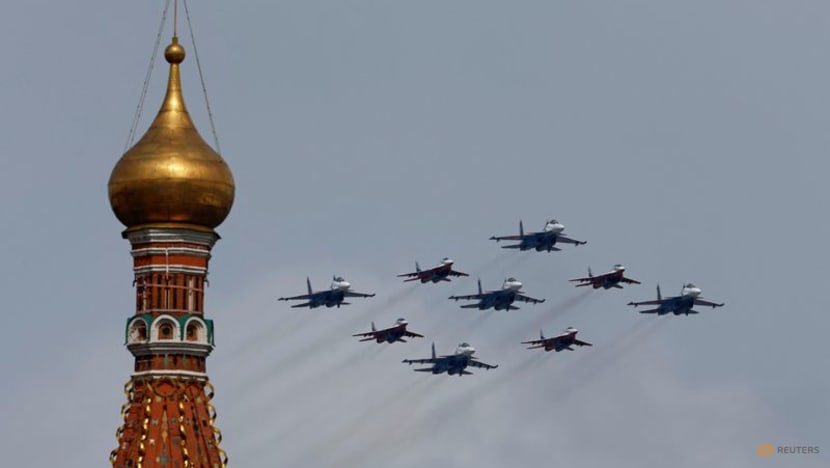Commentary: Is the Russian air force coming to Indonesia?
Indonesia says Russia isn't seeking an air base in Papua - but that doesn't discount Moscow's clear strategic interest in pursuing the idea, says this defence and security expert.

SINGAPORE: The story lasted barely a day but caused outrage in Australia and prompted a quick denial from Indonesia.
On Apr 14, the respected defence analysis company Janes claimed that Russia had asked Indonesia for access to the Manuhau Air Base on Biak Island in Papua. But when the rattled Australian Defence Minister Richard Marles sought clarification from Jakarta, his Indonesian counterpart, Sjafrie Sjamsoeddin, insisted the report was untrue.
But did the story have any truth to it? Why would Russia want access to an air base so far from home? And would Indonesia have given it serious consideration, and, if so, why?
Taking into account Russia’s strategic interests, the story was at least somewhat plausible.
The tiny Papuan island has been on Russia’s radar for nearly two decades. In 2006, Moscow proposed establishing a commercial satellite launch facility on Biak using heavy-lift Russian aircraft. That proposal fell through due to problems over the transfer of missile technology to Indonesia and opposition from the island’s inhabitants.
But in 2017, two nuclear-capable Tu-95 strategic bombers from the Russian air force refuelled at Manuhau Air Base before conducting an air patrol over the South Pacific. At the time, it was unclear why Jakarta had agreed to host the aircraft but it seemed to be a one-off.
RUSSIAN INTENT
If the Janes report is true, however, it would appear that Russia is intent on securing regular access to the air base. 
After all, Biak occupies a strategic location, only 1,400 km from the Australian city of Darwin and 4,000 km from Perth. In addition, the US territory of Guam is just 1,900 km away. All would be within range of Russian surveillance aircraft operating from Biak.
As Russia views America as its primary strategic rival, it has an intense interest in monitoring military activities in these three locations. The United States has a significant rotational military presence in Darwin. Guam is home to major US air and naval bases. And Perth will host US and British nuclear-powered submarines from 2027 as part of the AUKUS agreement, which Russia opposes.
For Indonesia, however, the story seemed much less plausible.
Since independence in 1945, Indonesia has regarded the presence of foreign military forces as incompatible with the country‚Äôs non-aligned status and ‚Äúindependent and active‚ÄĚ foreign policy. Multi-ethnic Indonesia is also very sensitive about perceived foreign support for separatist movements in the country, including in Papua, which still has an active separatist movement.
When Australian-led forces intervened to stabilise Indonesian-occupied East Timor in 1998, it triggered a near-existential crisis in Jakarta. Six years later, and with feelings over that incident still raw, Indonesia initially hesitated to allow foreign military forces into independence-leaning Aceh to provide humanitarian assistance in the wake of the devastating Indian Ocean tsunami, though ultimately it did so.
NOT PLAUSIBLE, BUT NOT IMPOSSIBLE
Indonesia’s sensitivities over sovereignty, and its opposition to separatist movements, led it to vote in favour of resolutions at the United Nations General Assembly which condemned Russia’s invasion of Ukraine in 2022 and Moscow’s support for separatism in the Donbas area of eastern Ukraine.
A Russian military presence at Biak would also damage Indonesia‚Äôs strategic ties with the United States and especially neighbouring Australia. When the Janes story broke, Prime Minister Anthony Albanese immediately declared, ‚ÄúWe obviously do not want to see Russian influence in our region, very clearly‚ÄĚ, and emphasised Australia‚Äôs opposition to Russian aggression against Ukraine.
From Indonesia’s standpoint, the idea of a Russian military presence in Papua was not very plausible. But that does not make it impossible.
Indonesia’s Constitution does not explicitly forbid foreign forces from being stationed in the country, and during the Sukarno era, when defence ties between Indonesia and the USSR were tight, there were plenty of Soviet military advisers in the country.
President Prabowo Subianto has a tendency to make snap decisions, some of which have been criticised for contravening the country’s non-aligned policy (his 2022 Ukraine peace plan) and undermining the country’s sovereignty (a 2024 joint communique with China which made Indonesia a party to the South China Sea dispute).
STRANGER THINGS?
Moreover, Prabowo is keen to strengthen bilateral relations with Russia, including defence ties. As defence minister and president-elect, Prabowo visited Russia four times, most recently in July 2024. In February 2025, Sergei Shoigu, Russia’s former defence minister and now secretary of the Russian security council, visited Jakarta. 
According to Janes, it was either at that meeting, or shortly thereafter, that Russia made the request to use the air base on Biak Island.
Intriguingly, there could also be a link between the 2017 visit by Russian strategic bombers to Biak and the recent Janes story.
As noted, it was unclear why Indonesia had agreed to host the refuelling mission. At the time, however, Indonesia and Russia were negotiating the sale of 11 Su-35 fighter aircraft for US$1.14 billion. As part of that deal, Russia may have requested access to Manuhau Air Base (Russia has a similar agreement with Vietnam for naval and air deployments to Cam Ranh Bay). 
The Su-35 deal was signed in 2018 but collapsed three years later, allegedly due to the threat of US sanctions. But under Prabowo, the procurement of Russian fighter aircraft may now be back on the table. Did Moscow push the envelope by offering Indonesia a discount on the aircraft in return for landing rights on Biak?
At the end of the day, due to sovereignty concerns and Indonesia’s foreign policy principles, it was always unlikely that Indonesia would agree to Russia’s request. But stranger things have happened.
Ian Storey is a senior fellow at ISEAS - Yusof Ishak Institute. This commentary on ISEAS - Yusof Ishak Institute’s blog, Fulcrum.












